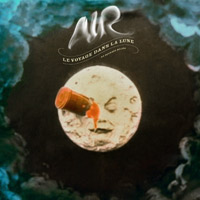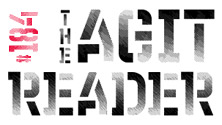
Ain’t No Lies in Blood
Thick Syrup/Bang!
Before hanging up their boots some 15 years ago, The Chrome Cranks released three studio albums of greasy, noise-festooned garage rock informed by the punk strains infesting the Lower East Side at the time as well as the lineage of the blues once birthed in the lower half of the country. While there’s no denying the gravitas of the gut-shaking emanations that the band unleashed in its prime, it’s probably safe to say that such slash-and-burn sounds were never going to attract the more pusillanimous ears of the mainstream.
As such, when the Cranks returned to the stage a few years ago it was welcomed, albeit surprising, news. Similarly, the band’s new album, Ain’t No Lies in Blood, shows that the years have done little to diminish their collective belly fire. The record starts with the wonderfully monochromatic “I’m Trash,” which posits a caveman stomp of a backbeat with a couple repeating guitar lines, one fuzzy and one coarse. This nose-to-the-grind approach permeates the album; aside from the feral cat strut of “Rubber Rat,” the Chrome Cranks keep to a straight and narrow path of righteously unfiltered ruckus. This is evident in the buck of original “Broken-Hearted King” and their scorched take on “Black Garage Door” by The Libertines (the ’80s Ohio band, not the ’00s UK coofs). The band takes the album to an epic conclusion with a wooly 10-minute version of The Byrds’ “Lover of the Bayou.” When the song comes to a fitful noisy ending, it’s just the last bit of evidence that the Chrome Cranks have got something that’s been sorely missed all these years.
Stephen Slaybaugh

Angels of Darkness, Demons of Light II
Southern Lord
Angels of Darkness: Demons of Light II, the sequel to Earth’s 2011 album, finds the Seattle band continuing what might be characterized as its ongoing quest toward full instrumental rock transcendence. It’s been a long journey—one begun by guitarist and band leader Dylan Carlson in 1989—but one that still produces fascinating, practically peerless music.
Other than the clear, almost bright invocation that is opener “Sigil of Brass,” Angels II takes on a darker tone than that on its predecessor, as if the album is a soundtrack to a day plagued by a sense that something seriously heavy is about to go down. “Waltz (A Multiplicity of Doors)” sounds like a walk through a Western landscape, with guitar and bass riffs that saunter along at a slow snail’s pace and seem to be up to no good as Lori Goldston’s cello drones and buzzes. The mostly forward-moving progression of “Waltz” stands in interesting contrast with the sound of “The Corascene Dog,” which utilizes the same elements but instead seems to rise upward and dissipate like smoke during the course of the song’s eight minutes. Album closer “The Rakehell” nicely concludes the record, using the repetition of a single riff as a base from which Carlson is able to set off on far-reaching, yet confidently restrained, guitar improvisations. Angels II reveals a band that has not only staked out a singular space on the sonic terrain, but also intends to continue to expand outward.
Ron Wadlinger

I Will Set You Free
Central Control
Barry Adamson has had probably one of the most diverse careers in music. He started as the bass player for Magazine and then joined Nick Cave and the Bad Seeds for their first batch of albums before leaving for a solo career. While it would be logical that Adamson would continue in the same vein as his other bands, he instead fashioned himself as the curator of soundtracks for noir films that didn’t exist. In a fitting twist, such work lead to a career of composing for actual films, working with David Lynch among others, as well as TV shows and commercials. But he has always returned to his original concept. That deceptively simple idea has allowed Harvey a large degree of sonic freedom, as can be heard on his 10th solo album, I Will Set You Free.
While I Will Set You Free isn’t explicitly a continuation of his series of soundtracks for fake films, you can’t help but see the common threads. There are snatches of sound effects and some very cinematic underpinnings that pop up. For example, “The Trigger City Blues” sounds like a mini noir audio play, complete with a gunshots and a cliffhanger ending. But the record is primary a pop-leaning rock and soul record, only with sophisticated instrumentation and arrangements. Even in the midst of the most straightahead rock tune, there’s a Bacharach-esque horn part or an impossibly tasteful piano section. It’s as if it’s impossible for Adamson not to put in those little touches that add just the perfect amount of sonic depth. Here, he also proves himself to be a surprisingly agile frontman. While on other records he’s either let other people handle the vocal duties or focused on instrumentals, this time his voice is front and center. Reminiscent of Baby Bird or Jarvis Cocker, his vocals convey a classic Britpop style, if there is such a thing. I Will Set You Free is a surprising album that deserves attention.
Dorian S. Ham
MP3: “Turnaround”

Le Voyage dans la Lune
Astralwerks
Just... ugh. I understand this is a soundtrack to a restored version of the album’s namesake—the classic, silent film about about a rocket trip to the moon—so maybe I shouldn’t expect it to be on par with Air’s other work. But even the duo’s records that are not explicitly labeled as soundtracks sound like they could be, so I was really hoping for more. Bottom line? There’s almost nothing on Le Voyage dans la Lune that’s worthy of being in the Air catalogue.
Opener “Astronomic Club” is a rancid take on the music Portishead was making 15 years ago. “Parade” might be interesting to you if you’re a really big fan of music from video games. “Sonic Armada” is as annoying as you’d probably guess a poor man’s RJD2 would be. And “Who Am I Now” is trying very, very hard and probably works well with the film, but on its own achieves nothing but grating kitsch. (Full disclosure: I find the film pretty grating as well.)
There are a few near-successes. “Moon Fever” is one of those peaceful yet disquieting tracks Air has been able to perfect once on about half of their albums. This one’s not perfection, however. “Seven Stars,” featuring Beach House’s Victoria Legrand, has some cool percussion and an interesting ending, even if it does sound like it’s built around a David Grey sample. And with “Cosmic Trip,” you might finally believe these are the same guys who made the wonderful Talkie Walkie album, but you know in your heart they’ve written better versions of this song many times before. Le Dans might be useful if you’re actually watching a century-old so-bad-it’s-good sci-fi movie, but it’s not good for much else.
Matt Slaybaugh

Beaus$Eros
Fake Four
Busdriver (a.k.a. Regan John Farquhar) began testing the confines of “genre” more than a decade ago with the 1999 release of Memoirs of the Elephant Man. One can surmise that from a relatively young age, Farquhar knew the innate limitations this simple noun could impose. Perhaps this is the reason he continually pushes the boundaries of hip-hop until it folds into a parody of itself. With his first studio release since 2010’s Computer Cooties, Busdriver embarks on a road trip of mind-altering proportions, the results of which are meticulously documented on Beaus$Eros.
Leading with video game notes and a didgeridoo hum, the album begins with the relatively subdued “Utilitarian Uses of Love.” It’s kind of like watching Little Mermaid on acid, which sets the tone for the rest of the long, strange trip upon which this album embarks (albeit without the awful jam-band fanfare). Busdriver’s incarnation of hip-hop is weird, wacky, experimental, and fits much better on Fake Four than he ever did on the conventional tether of Epitaph.
Beaus$Eros’ initial single, “Bon Bon Fire,” is a weird mash-up of electronica and hip-hop that would sound at home on the Anticon label. Yet, the album progresses into something much more than an experiment of sounds. Take, for instance, the languid, pseudo-reggae malaise of “Picking Band Names,” wrought with clever off-beats, where the background noise (negative space) means as much, if not more, than what’s happening in the foreground. Then, of course, there’s the annoyingly titled song with annoying subject matter (gossip column, celebrity, blah blah blah), “Ass and Mouth,” that is annoyingly great. Damnit, why does his voice have to sound its best when the lyrics are at their most inane?
In the end, you have to commend Busdriver for obliterating the boundaries of so many styles and eras and genres; from R&B to blues to hip-hop to ’80s synth-pop to psychedelia—the list of genres goes on an on into infinity. Yes, it’s a slightly psychedelic departure from previous albums, but Beaus$Eros is, at its core, a sardonic social commentary. Don’t get me wrong, it’s a mindfuck. Kind of like that Windows screensaver that changes direction and color and shape, it may seem random, but the perfectly timed rotations are mesmerizing—even hypnotizing—in the end.
Jennifer Farmer
ALBUM REVIEWS
Of Montreal, Paralytic Stalks
Heartless Bastards, Arrow
Royal Baths, Better Luck Next Life
Prinzhorn Dance School, Clay Class
Leonard Cohen, Old Ideas
Imperial Teen, Feel the Sound
Fionn Regan, 100 Acres of Sycamore
Ben Kweller, Go Fly a Kite
Tally Ho! Flying Nun's Greatest Bits
First Aid Kit, The Lion's Roar
Pop. 1280, The Horror
Gonjasufi, MU.ZZ.LE
Penelope Houston, On Market Street
Cardinal, Hymns
